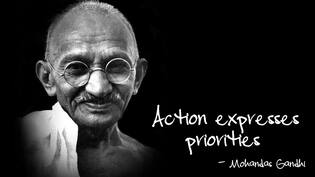What matters most?
Wright, N. (2019), 'What matters most?', Coaching and Life, 10 May.
I try not to feel intimidated as the muscle-bound giant walks towards me with tight vest and tattoos down his arms. ‘I mean…after all (I tell myself, being very careful not to say it out loud), I too could get a body like that if I spent every waking moment in the gym.’ But therein lies the stark difference. This guy wasn’t born like this. He trains, works out regularly and, over time, his muscles strain and grow. By contrast, I don’t. I may quite fancy the idea of looking like that but I’m simply not willing to put in and sustain the time and effort needed to get there. It doesn’t matter enough to me to do it.
It doesn’t matter enough to me. That’s the crux of the matter here. All things being equal, we have the same (well, same-ish) genetic potential and the same-ish time and resources available to us. I’m guessing that there’s something in this man’s cultural environment that means, in that context, a muscular physique is considered, say, admirable, useful and worthy of respect and thereby carries currency. It makes the hours spent in the gym, week after week, month after month, year after year, worthwhile. So, what we’re looking at here is context, culture, values, motivation, effort and reward.
I meet a woman at a coaching seminar. She says she wants to learn how to play tennis and asks me if I would coach her on how to take her next steps. I ask, ‘What makes learning tennis so important to you?’ She blushes, looks down and tears form in her eyes. ‘My partner loves tennis and I’m afraid that, if I don’t learn how to play it too, he will end our relationship.’ Her strong desire to stay in this relationship makes the challenge of learning tennis matter enough for her to do it. I ask her if she would like coaching on tennis, the relationship or why this person matters so much to her. ‘All 3!’
So, here’s the principle. We can focus coaching on a client’s presenting issues and enable the client to develop new practical skills and techniques. For many clients and situations, this is very useful. We can also focus coaching on a client’s underlying beliefs, values and motivations, especially if we or they notice e.g. ambivalence, hesitancy, anxiety, stuck-ness or an unwillingness or inability to persevere. This is where psychological, spiritual-existential and systemic coaching can make a very great difference. What matters enough to your clients to make the changes they need or desire?
